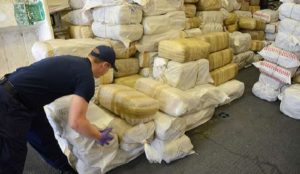Hizballah accused of turning Lebanon into ‘drug smuggling, terrorism hub’ under ‘Iran occupation’
BY CHRISTINE DOUGLASS-WILLIAMS
republished below in full unedited for informational, educational & research purposes:
Saudi Arabia declared last August that Hizballah has destroyed Lebanon — including its “constitutional and state institutions.” Saudi King Salman stated that the only way for Lebanon to break free is to disarm Hizballah. Salman even blamed the Beirut blasts on the “hegemony of Hezbollah, a terrorist organization affiliated with Iran.”
Lebanese authorities are in now evidently in agreement.
Once again, Iran continues to expand its influence throughout the Middle East, and via Hizballah, its influence extends worldwide. No nuclear deal would stop its expansion; in fact, it would have the opposite effect: it would enable hundreds of billions to flow into Iran’s coffers to further expand its nuclear program, as well as its regional and global power.
Adding to the woes of Lebanon stemming from Hizballah’s influence, the country’s farmers fear that “a recent produce ban by Saudi Arabia will be a decisive blow to their livelihoods.” Saudi Arabia has announced “an indefinite ban on Lebanese agricultural products after foiling an attempt to smuggle 5.3 million pills of the illegal amphetamine Captagon hidden in a shipment of pomegranates at Jeddah Port.”
Western leaders should unite against Iran and its proxies. Instead, Iran is haughtily swindling Western leaders into a new nuke deal.
“Saudi And Lebanese Accusations: Hizbullah Is Operating A Network For Smuggling Drugs To Saudi Arabia And The Region; It Has Turned Lebanon Into A Base For Exporting Drugs And Terrorism,” by Z. Harel and H. Varulkar, MEMRI, April 28, 2021:
Introduction
On April 23, 2021, customs authorities at the Saudi port of Jeddah announced that they had thwarted an attempt to smuggle drugs – mainly Captagon (fenethylline hydrochloride) pills, an amphetamine drug popular in the Middle East – in a shipment of pomegranates arriving from Lebanon. Subsequently, the Saudi Interior Ministry announced that beginning April 25, the country would accept no Lebanese imports of agricultural produce. The ministry added that it had previously warned Lebanese authorities about the increase in drug smuggling attempts from its territory, and that the ban would remain in force until the Lebanese authorities “provide satisfactory and documented guarantees that they have taken the necessary steps to stop the systematic smuggling against the kingdom.”[1]
Addressing the increase in smuggling attempts from Lebanon to Saudi Arabia, Saudi Ambassador to Lebanon Walid Al-Boukhari tweeted that in the past six years over 600 million pills and hundreds of kilos of hashish from Lebanon had been seized by Saudi authorities, and that the drugs smuggled via this route during that time “could drown the entire Arab world, not just Saudi Arabia.”[2] Additionally, Saudi Interior Minister Prince ‘Abd Al-‘Aziz bin Saud bin Naif tweeted that “the kingdom’s security is a red line.” [3]
On their part, the Lebanese authorities hastened to condemn the drug smuggling from Lebanon, and stressed that they would step up their efforts to prevent further smuggling.[4] In an April 26 meeting convened by Lebanese President Michel ‘Aoun, with Prime Minister Hassan Diab, ministers, and security and customs directors, ‘Aoun stressed that Lebanon was working hard to maintain good relations with the Arab countries and to preserve these countries’ security and stability. Also at the meeting, ‘Aoun called on the country’s security apparatuses to step up the fight against smuggling and those behind it,[5] and a series of measures for increased oversight of agricultural exports was put in place.[6]
As expected, the incident sparked widespread interest in Saudi Arabia. Although top Saudi government officials did not implicate any specific element in Lebanon for the drug shipment, the Saudi press published many articles and op-eds pointing at Hizbullah. Stating that Hizbullah was functioning as an organized crime network and had turned Lebanon into a base for waging direct war on Saudi Arabia, they added that the latest attempt to smuggle drugs into Saudi Arabia was one of many, and that the organization was acting to flood the kingdom with drugs in order to destroy it and bankroll its terror activity in the region.
There was also harsh criticism of Hizbullah in Lebanon, where journalists and politicians accused the organization and its political allies, including President ‘Aoun, of responsibility for drug smuggling and its impact on the country’s agriculture and economy, already in grave crisis. They accused the organization and the groups ruling Lebanon of bringing the country under occupation by Iran, of turning it into a hub for drug smuggling and terrorism, and of starving and weakening the Lebanese people. Some Lebanese politicians even defended the measures taken by the Saudis.
Hizbullah has not yet issued an official response, but articles published on its website and in the Al-Akbar daily, which is close to the organization, denied that Hizbullah was involved in smuggling drugs into Saudi Arabia. They also stressed that Saudi Arabia was falsely accusing Hizbullah in order to harm it and to bend Lebanon to its will. Another claim was that stopping Lebanese agricultural produce from entering Saudi Arabia was a purely political move, and that the Saudis were trying to starve the Lebanese people.
Charges that Hizbullah’s activities are bankrolled by the drug trade are nothing new.[7] A U.S. Drug Enforcement Administration (DEA) task force has, since 2008, been monitoring a global syndicate created by Hizbullah, with an estimated annual profit of over $1 billion from drugs and weapons.[8] In recent years, massive shipments of drugs smuggled by ship from Syria and Lebanon have been seized across the Mediterranean basin and the Middle East. For example, in June 2020, Italian authorities apprehended a billion dollars’ worth of Captagon arriving from Syria.[9] In light of this, and in light of the intense suspicion that Hizbullah was behind it, Hizbullah secretary-general Hassan Nasrallah, in a January 2021 speech, vehemently denied the accusations and clarified that any activity connected to drugs was forbidden by Islam and the penalty for it was death. He added that any operative found to be linked to drugs was immediately and permanently banned from the organization.[10]…

